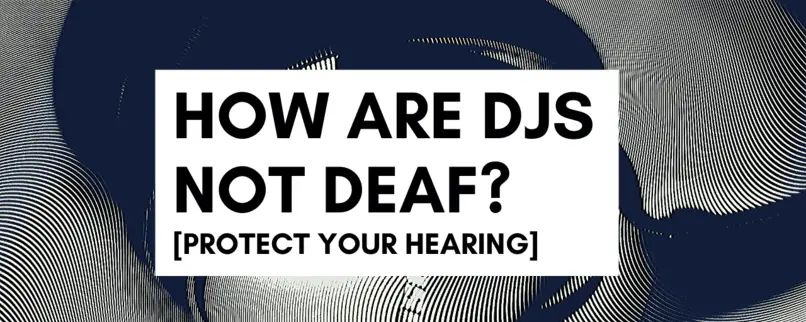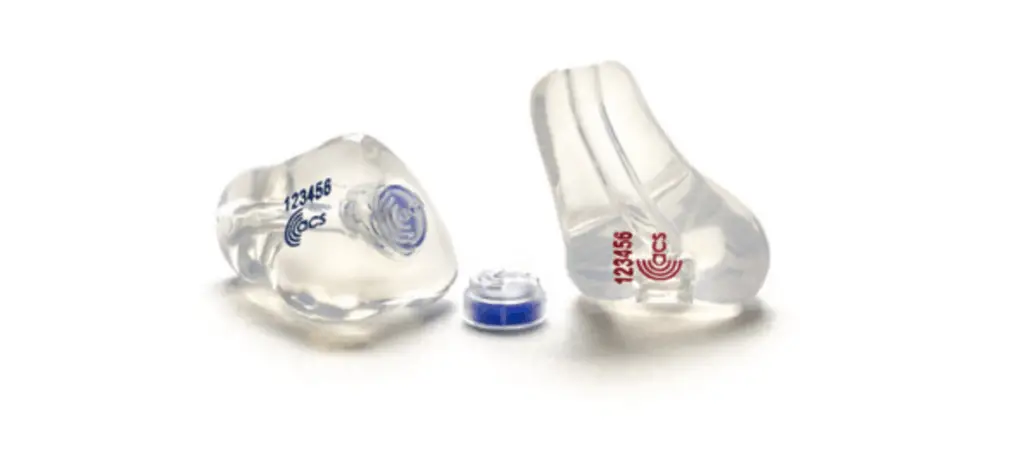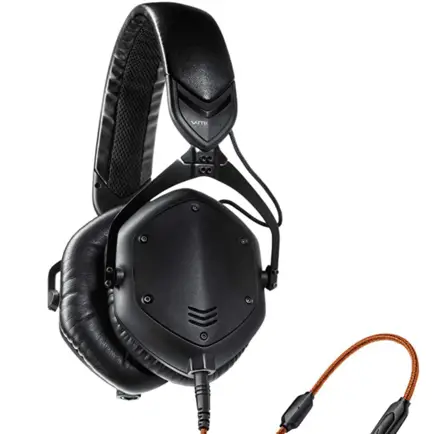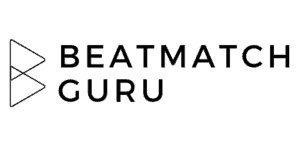
DJs can be exposed to loud music a lot of the time throughout their DJing careers. Even if you’re starting out as a DJing in clubs the decibels can be very high which can put you at risk from such loud music.
How are DJs Not Deaf? DJs are not all deaf due to in-ear protection (moulded to suit the ear shape of the DJ), quality of the DJ headphones and some clubs strictly implement decibel limits to restrict damage to hearing for DJs and club goers.
In your life there maybe a time when you’ve once though got so many gigs going on that you might be worried that the loudness will put your hearing at risk. Even if you’re DJing louds, your hearing could diminish even at home DJing. There are ways and means to protect your hearing, you just need to be aware of them.
In-Ear Plugs
In-ear plugs are the go to format for which I use if I’m DJing or in a club dancing the night away. If you’re like me then being cautious about my hearing is number one thing I care about when going to be surrounded by loud music.
There are some basic in-ear plugs that you can get cheap.
Mainly these types of ear plugs are what you get for free at some gigs or used in construction. I must say from experience, the high end and mid frequencies are taken down a dramatic amount. Not offering the best listening experience to be honest. Having said that it certainly does reduce those harsh frequencies hitting your ears.

A better, more professional (which means more expensive) type of in-ear plugs are the ACS ear plugs. The look clear and like jelly, more importantly these types of ear plugs are moulded to fit your ears. So before you buy them you need to invest in an actual mould of your inner ear. Then you can buy them after.
Yes, there’s ACS range of course and each model supports different attenuation in decibels, ranging from around 15 to 37 dB. This is great for volume and also each model provides certain protection against harmful mid and especially high-end frequencies.
Here’s the brand’s website for you to investigate more detail for yourself.
Headphone Quality
Noise Cancelling vs Noise Isolating
It’s really important to invest in a very high quality set of headphones if you are to play regularly in loud environments.
Technology is a wonderful thing and headphone manufacturers have crafted noise cancelling headphones.
Noise cancelling headphones actively use built-in technology to block out sound from outside (or otherwise known as the club or event you are playing). Loud music can be reduced dramatically in your ears from the noise cancelling headphones.
A close relative to these headphones are also noise isolating headphones. These types of headphones do not use technology built-in to block outside noise. The actual headphones themselves do the blocking of outside ambient noise.
For example, in-ear headphones can do a decent job to achieve blocking ambient noise. On the flip side normal headphones can have substantial padding to help block out excess noise. Some headphones can sit tightly on your head too to help hold the padded headphones in place.
Use Your Headphones Wisely
Of course this is all pointless if DJs do not keep them on the whole time. So if you do invest in headphones that are high quality and help support protecting your ears then it’s worth keeping them on for the majority of time.
As you may of seen, a lot of DJs have one ear on the left headphone, and the right ear listening to the sound in the DJ booth speaker (aka booth monitor). This image of a DJing using the headphones this way is almost iconic in a lot of modern day electronic music genres.
If you want to enjoy and listen music in the long term then it is highly advisable to use the headphones how they are supposed to be used, on both ears for as long as possible during your DJ set.
Invest in Quality
Some DJs I know use a combination of both high quality headphones and then move to noise cancelling headphones later in the night. Some DJs in electronic music might only DJ for 60 minutes and then be done for the night which can be useful for short term exposure.
On the other hand some DJs might DJ music at events such as weddings or mobile DJ based events. This can involve DJing for extended periods of time. For example a wedding might take 4 to 5 hours, maybe longer. So that’s why it would be important to use noise cancelling headphones, for when the music is louder later in the night.
At the beginning of the night it might be fine to use your normal noise isolating headphones, and then switch to noise cancelling later into the night, loudness depending.
Top Headphones to Check Out
Noise-Cancelling: Bose QuietComfort Headphones
Noise-Isolating: V Moda Crossfade -100 Headphones

Time to Invest in Noise Cancelling Headphones?
What you do need to keep in mind that with a lot of technology based products (especially new-ish technology on the market) the price can be higher than existing products. However, if you’re a full time DJ and make a fair whack of money, then it’s a no brainer to invest and save your ears to hear wonderful and beautiful music in the long term.
If you’re starting out as a DJ, you might not need to invest just yet. It’s worth keeping in mind for your future to invest. In the meantime, use a combination of in-ear and normal headphones. Test them out and see what works for you best.
Club Loudness Controls
Speaker and Audio Quality
Some clubs are shocking, they don’t look after the sound that well and loudness is not the only issue, it’s distortion and high frequencies.
I’ve found that some venues that are NOT clubs usually are the worst. They have not been sound tested the best and probably don’t have the best equipment to play high quality audio.
Point being, is that regular DJs that play a lot still get by and manage to protect their hearing. Some DJs may not though, but it doesn’t mean all DJs will have hearing problems later down the line.
Personality Traits of DJs
The factors that have come to light to me over the years of listening to music in clubs and DJing too is that amount of time exposure is a massive factor, combined with total decibels and distortion/high frequencies.
It’s key to be aware of these factors and be cautious and prepared for these situations. DJing can be your livelihood, so being mindful and investing in your long term hearing makes a lot of sense. Loudness with DJing is a hazard of the job but can be managed with varying degrees.
Being organised, prepared and diligent are the key traits of DJs that can protect their ears. And that means not getting drunk at every gig. Getting pissed up out of your face before, during or after a DJ set will certainly increase your chances of compromising the protection of your hearing.
Life Outside of DJing
Listening to Music
If you’re like me and music is your life then there’s a very high chance that you listen, enjoy and research music on a regular basis.
What this means is that it’s very likely that your exposure time is high as a result. How you manage the volumes being pumped out of your headphones or speakers is usually up to you to control, however I’ve recently got a new iPhone and have put a limit to the maximum volume output.
This has really helped me out because I zone out a lot when enjoying music and noise levels can very loud, especially if walking down the street in a busy city. Now I don’t need to worry about the maximum volume control limits too.
Why is this important for DJs? Well it’s key to long term protection of hearing and I know from research online that DJs out there that take these precautions too. A few of my DJ friends take similar approaches, using apps to help control the volume over a period of time is reduced.
Music Production and DJing Loudness
Artists that are into music production and DJing tend to be at more risk and exposure. Mainly because of music production being a loud environment in a studio where all sorts of frequencies, noises and loudness can play a part during the day, followed by DJing in night time.
Do the math, that adds up to quite a lengthy amount of time exposed to loud audio.
One of the guys from Noisia, the Drum and Bass trio based in Amsterdam, mentioned on one of their podcasts that they use in-ear plugs when walking about town after a long music production studio.
Every Day Ear Protecting Habits
Simply to protecting and giving your ears a break from exposure outside of DJing can really pay dividends in your future hearing abilities and quality.
It is possible to protect your hearing, a lot of DJs do but not all. Before you get into DJing full time, my advice would be to change your daily habits to help protect your hearing outside of the world of loud clubs and DJ sets. This will create good habit forming for when you eventually reach your goals of becoming a DJ.
Related Questions
Do all DJs have tinnitus?
Not all DJs have tinnitus as it really depends on whether a DJ has taken preventative measures to protecting their hearing. Quality of headphones can support protecting hearing and in-ear plus moulded to the DJ’s ears can protecting their ears.
Why do DJs only use one headphone?
DJs use one headphone because when they are cueing up a track they can here the live track being played in which to beat match with. It is not essential to use this method as most DJ mixers allow DJs to keep headphones on all of the time and listen the live mix through the headphones.
